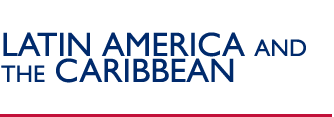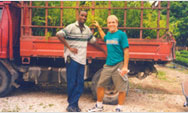 Photo: Julio Román, Prensa Libre
“Schools in this project will have classes that are created rather than classes that are just given. For us this is a profound change that will benefit many generations to come. We are very thankful to you.”
-Ministry of Education Supervisor in Quiché Department
USAID Assistance to Guatemala
|
CONTACT INFORMATION
Mission Director
Wayne R. Nilsestuen
USAID/Guatemala
Km. 6.5
Final Boulevard Los Próceres
Santa Catarina Pinula
Guatemala, Central America
Desk Officer (Washington) Katya Sienkiewicz
Desk Officer Tel: 202-712-0177 E-mail: KSienkiewicz@usaid.gov
|
|
Overview
Guatemala is the largest Central American country in terms of population. With approximately 13 million people and a growth rate of 2.8%, which surpasses its Latin American neighbors, the country’s population doubles about every 25 years.
 Guatemala is a land of sharp contrasts. It boasts awealth of unique natural resources and a diverse cultural heritage, yet an estimated 56% of its people still live in poverty. The nation has second most skewed income distribution in the hemisphere. Most of Guatemala’s poor are rural indigenous people of Mayan descent who have suffered a long history of repression and exclusion from full participation in society. They were also the most seriously affected by the 36-year armed civil conflict that claimed more lives than recent conflicts in El Salvador, Nicaragua, Chile and Argentina combined. Guatemala is a land of sharp contrasts. It boasts awealth of unique natural resources and a diverse cultural heritage, yet an estimated 56% of its people still live in poverty. The nation has second most skewed income distribution in the hemisphere. Most of Guatemala’s poor are rural indigenous people of Mayan descent who have suffered a long history of repression and exclusion from full participation in society. They were also the most seriously affected by the 36-year armed civil conflict that claimed more lives than recent conflicts in El Salvador, Nicaragua, Chile and Argentina combined.
Significant progress has been made to turn this tide since the signing of the Peace Accords in 1996. The country has strong potential with rich natural resources, management talent and a large and young labor force, proven capability to produce high-quality products, and favorable access to U.S. and Central American markets. Nevertheless, Guatemala is a highly divided society with many weak and antiquated public sector institutions and deep rural poverty. It is increasingly threatened by migrations, gang violence, escalating crime rates and the corrosive effects of narco-trafficking.
Working with public sector institutions, civil society, the private sector and other donors, we are supporting numerous reforms initiated by President Berger’s Administration—fighting corruption, increasing public sector transparency, accountability and management, promoting rural development and competitiveness, and improving access to and quality of health care and primary education. USAID is also collaborating with the private sector and NGOs to open new markets, create jobs and raise incomes of the poor, and forge public-private partnerships committed to a broad development agenda.
To reach all citizens in Guatemala, USAID supports programs in democracy and the rule of law, economic growth, health and education.
Programs
Democracy and Rule of Law:
USAID responds to the most important threats to Guatemalan democracy—insecurity, crime, corruption and political exclusion--with programs in crime prevention, anti-corruption, justice, and local governance. We work with the Guatemalan government to promote judicial reform, establish crime prevention councils, undertake community-based policing efforts, provide youth training and job placement as alternatives to gang membership, and support to local governments so they are more effective in responding to constituents’ needs. We supported the 2007 electoral process through technical assistance to the electoral tribunal and a domestic observation group.
Economic Growth:
USAID helps enterprises become more competitive in global markets to take advantage of the Central America-Dominican Republic (CAFTA-DR) Free Trade Agreement.. We support rural development and promote efforts to build competitiveness of rural-based small and medium-sized business in tourism, forestry and agro-industry sectors and link them to new markets. USAID implements a loan program using Development Credit Authority (DCA) funds that increases access to medium-term investment credit for small and medium-sized businesses.
Education:
USAID programs focus on increasing investment, transparency and accountability in public expenditure for education. Assistance is targeted to improve the quality of education, boost primary school completion rates, and build public-private partnerships to help bridge the gap between educational attainment among rural indigenous populations and the rest of the country.
Health:
USAID is supporting the Guatemalan government’s efforts to expand access to quality health care by promoting increased social sector investments, ensuring transparency in public expenditures, and developing partnerships with the corporate sector. Our health programs focus on access to quality maternal-child health care, preventing HIV/AIDS, and improving nutrition practices, reproductive health and family planning services.
Environment:
Our work fosters environmentally-sound management of natural resources in priority areas of biodiversity. This management simultaneously provides income-generation alternatives such as certified timber production and eco-tourism ventures, as well as “green-friendly” and sustainable agricultural production to people living in and around the protected areas.
Food Security:
USAID manages one of the largest P.L. 480 food security programs in the hemisphere. Resources provide essential support to vulnerable populations, especially women and children, through programs that integrate nutrition, animal husbandry, micro-enterprise, health, education, improved local governance, and sustainable environment practices.
Disaster Response:
USAID has been and continues to be an active player in the disaster relief, rehabilitation and reconstruction efforts following Tropical Storm Stan, which hit Guatemala in October 2005.
Regional HIV/AIDS:
USAID/Guatemala manages the Central America and Mexico regional program for HIV/AIDS as part of the U.S. President’s Emergency Plan for AIDS Relief (PEPFAR). This program helps contain HIV/AIDS through implementing improved policies and targeted behavior change programs for the most at-risk populations. |


